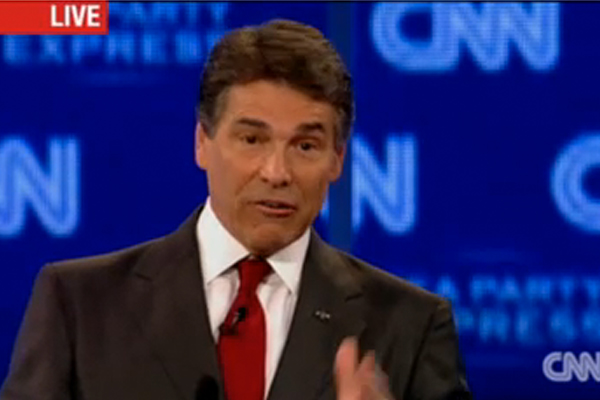Rick Perry’s performance in Wednesday night’s Republican presidential debate was not disastrous and he may well go on to win the GOP nomination. The views he expressed on most issues are perfectly in line with those of the party’s base, voters who probably also appreciate his confident, almost cocky demeanor. The mere mention by one of the debate moderators of the 234 executions he’s signed off on in Texas prompted some of the biggest cheers of the night from the live audience.
“I think Americans understand justice,” Perry explained.
And yet this was still a potentially problematic debate for Perry, mainly because Republican base voters were not the sole audience tuning in. In fact, they may not have even been the most important audience tuning in. That distinction probably belongs to to the GOP’s opinion-shaping elites, the elected officials, activists, interest group leaders, fundraisers and commentators whose judgments — and rationalizations — can play a major role in influencing base voters’ ultimate decisions. Many of these elites have been struggling with what to make of Perry, and his performance on Wednesday probably reinforced the doubts they’ve had about him.
There were some substantive reasons for this, especially when the discussion turned to Social Security, which Perry described in a book he wrote last year as a “failure” that “we have been forced to accept for more than 70 years now.” At the debate, he refused to back off, confidently repeating previous claims that the popular entitlement program is a “monstrous lie” and a “Ponzi scheme” and suggesting that “maybe it’s time for someone to have some provocative language in this country.”
Does this rhetoric automatically offend the GOP’s base voters? For the most part, probably not. (Although it does raise the question of whether Perry’s support among Republican voters over the age of 65, with whom he currently enjoys his best poll numbers, might take a hit.) But it should make November-minded Republican elites very nervous. As Republicans from Barry Goldwater to George W. Bush have learned, general election voters tend to love small government rhetoric — almost as much as they love Social Security.
Perry’s response provided an opening for Mitt Romney, who gladly took it. “Our nominee,” he said, “has to be someone who isn’t committed to abolish Social Security but is committed to saving Social Security. I will never say by any measure it is a failure.” In reality, there probably isn’t much difference between what a President Romney and a President Perry would actually do on Social Security. But there appears to be a world of difference in how they’ll talk about the issue as candidates. Perry’s white-hot answer on Wednesday night seems like exactly what the Wall Street Journal editorial page — a pillar of GOP elite opinion — was referring to when it expressed concerns recently about “how well his Lone Star swagger will sell in the suburbs of Ohio, Wisconsin and Pennsylvania, where the election is likely to be decided.”
The other problem for Perry was stylistic: He didn’t come across as especially sharp, particularly as the debate wore on. In the early moments, he was punchy, picking a fight with Romney over job creation by bragging that “We created more jobs in the last three months in Texas than he created in four years” in Massachusetts. He also, not at all surprisingly, took shots at the individual healthcare mandate that Romney enacted in Massachusetts.
But the discussion became uncomfortable for Perry at times, and it showed. The lower-tier candidates (particularly Ron Paul) seemed to get under his skin, and he couldn’t keep himself from lashing back. And when he was asked to defend his climate change skepticism, Perry struggled to formulate a coherent reply, awkwardly asserting that “Galileo got outvoted for a spell.”
Again, climate change skepticism is hardly a liability when it comes to appealing to today’s GOP base. But there’s an art to it, and it’s the sort of thing Republican elites are probably looking for: Will this candidate be able to convince swing voters in the fall that he isn’t actually serious about all of this nonsense? As Perry was grasping for words on climate change, David Frum, the former Bush speechwriter, tweeted that “Perry is like Will Ferrell doing Bush, only on half speed.” Around the same time that Guy Benson, a conservative radio host, tweeted this: “Really like Perry, but I’m starting to see why he’s earned a reputation as a hit-and-miss debater.”
Those are the kinds of assessments that Romney is depending on. And in that sense, Wednesday night went quite well for the former Massachusetts governor, who showed up ready for Perry’s attacks and handled them well. When, for instance, Perry bragged about creating more jobs than he had, Romney shot back that Texas is a different state — bigger, Republican-dominated, more natural resources, right-to-work laws. “Those are wonderful things, but Governor Perry doesn’t believe that he created those things,” Romney said. “If he tried to say that, well, it would be like Al Gore saying he invented the Internet.” The crowd loved that one. Plus, one of Perry’s own issues vulnerabilities came up, with three of the lower-tier candidates chastising him for his 2006 decision as governor to mandate HPV vaccines for high school girls. It was a reminder that Romney isn’t the only GOP prospect with some explaining to do when it comes to the base.
It’s easy to read too much into a debate, but if Wednesday night did nothing else it proved that the biggest threat to Rick Perry’s candidacy continues to be Rick Perry.

